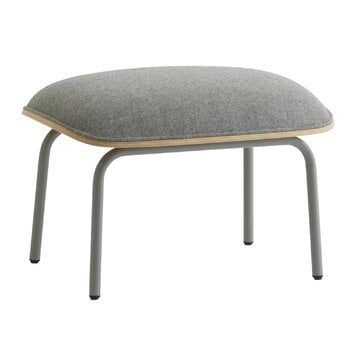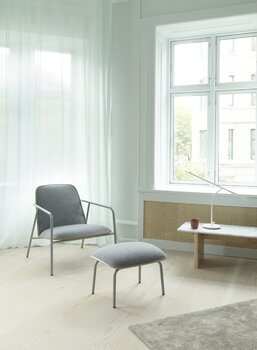Normann Copenhagen’s Pad footstool has a refined modern look that is created through the spare design and the combination of different materials. The thin metal frame, the shell molded of oak or ash veneer and the padded, upholstered seat create a harmonious whole, and the rounded corners add a touch of softness to the boxy shape. The light and sleek footstool brings the subtle elegance of Danish design to lounges, living rooms and lobby areas; combine the footstool to the Pad lounge chair or place it for example in the entryway as a seat on its own. The Pad footstool is designed by Simon Legald.
Pad footstool, grey steel - oak - Synergy LDS 16
Normann Copenhagen
Description
Normann Copenhagen’s Pad footstool has a refined modern look that is created through the spare design and the combination of different materials. The thin metal frame, the shell molded of oak or ash veneer and the padded, upholstered seat create a harmonious whole, and the rounded corners add a touch of softness to the boxy shape. The light and sleek footstool brings the subtle elegance of Danish design to lounges, living rooms and lobby areas; combine the footstool to the Pad lounge chair or place it for example in the entryway as a seat on its own. The Pad footstool is designed by Simon Legald.
Product details (12)
- Colour
- Grey, oak
- Width
- 60.5 cm
- Depth
- 45.5 cm
- Height
- 41 cm
- Frame material
- Lacquered oak veneer
- Upholstery fabric
- Camira Synergy LDS 16: 95% virgin wool, 5% polyamide
- Base material
- Powder coated steel
- Weight
- 12 kg
- Care instructions
- Clean with textile or upholstery cleaner. Frequent vacuuming with a soft fitting is recommended.
- Seat cushion
- Polyurethane
- Abrasion resistance
- 100,000 Martindale
- Lightfastness
- 5
- Product ID
Designer
Simon Legald (b. 1986) is a Danish designer and Head of Design at Normann Copenhagen. Graduating from the Royal Danish Academy of Fine Arts in 2012, Legald began his long and productive collaboration with Normann Copenhagen shortly after. His designs blend traditional craftsmanship with industrial techniques, focusing on modern simplicity and a precise balance between functionality and visual aesthetics. One of Legald's best-known works is the Form chair collection, which received the iF Design Award in 2016.
View all productsReviews (0)
Sustainability
The Product Sustainability Framework, our criteria of sustainable design, helps you find the most sustainable products in our selection. Read below which sustainability criteria this product has met.
Working conditions & labour 7/9
-
Equal opportunities for all employees
-
Commitment to UN Global Compact, fair compensation for all employees
-
Corporate responsibility requirements defined and communicated for suppliers
-
Systematic work for improved inclusion and well-being in the workplace
-
Transparent supply chain
-
Suppliers' compliance to a code of conduct ensured
-
Compliance to the UN Guiding Principles on Business and Human Rights ensured in the supply chain
Eco-friendly production 6/9
-
Fair and resource-wise water-use in production
-
No incineration or landfilling of returned items
-
No use of endangered species as materials
-
No direct environmental emissions or waste (excl. GHGs) from production
-
Material-efficient and ecological packaging
-
No potentially harmful chemicals used in own production
Climate impact 4/8
-
Company's direct greenhouse gas emissions identified and commitment to reduction
-
Product's carbon impact identified and commitment to reduction
-
Guidance on energy- and eco-efficient use of the product
-
Contribution to climate initiatives beyond the brand’s direct operations
Sustainable materials 3/6
-
Sustainable and long-lasting material choices
-
No harmful or hazardous substances
-
Responsible raw material sourcing and production
Circular design 3/5
-
High aesthetic quality promoting long-term use of the product
-
Technically durable product design and material choices
-
Design for enduring life-long quality








